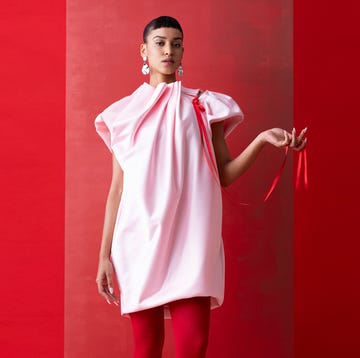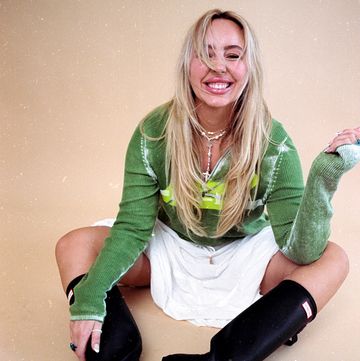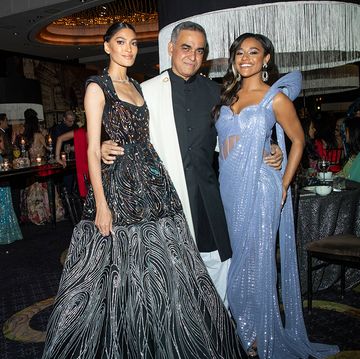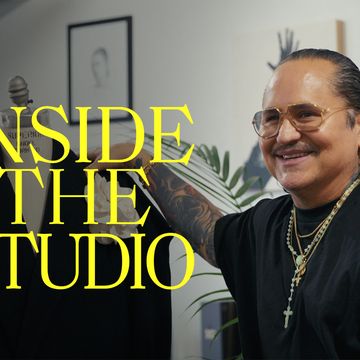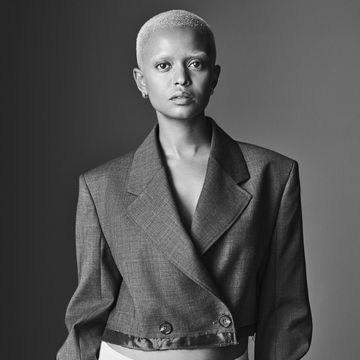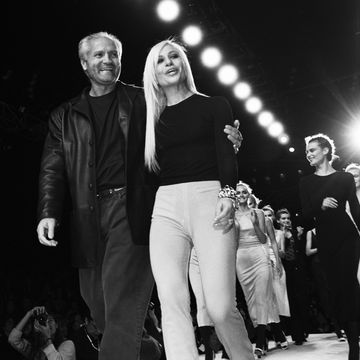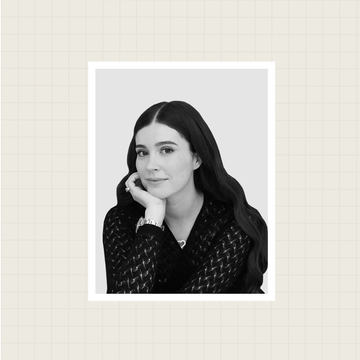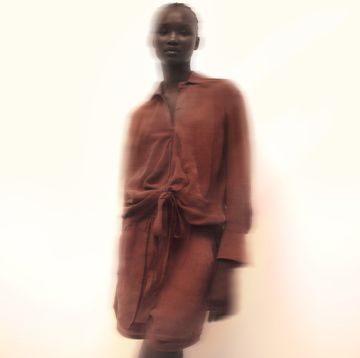"You are calling me from a cell phone," Fran Lebowitz , the cultural critic, writer, and sometimes actress announces, mere seconds after I say hello. She says it's the worst connection in the history of the world, and she'll only continue with the interview if I call her from a landline.
Not having one of those, I suggest we meet at Burger Heaven, where I find her waiting behind a fountain soda the size of a lectern. Eventually she forgives me for being four minutes late, and launches into a series of mini-lectures on fashion—including topics such as: "Yoga pants are ruining women," "This most recent revival of platform shoes embodies everything that's wrong with young people," and "Men in shorts are disgusting"—as well as many other sartorial tirades.
Kathleen Hale: You don't have a uniform, per se, but you wear a jacket, a men's shirt with cufflinks, Levi's jeans, cowboy boots, two gold rings, and tortoiseshell glasses every single day.
Fran Lebowitz: Yes.
Walk me through your outfit.
This jacket is fromAnderson and Sheppard in London. I don't go there, they come to me. Or they did. Now they have a dummy made of me.
What people don't know is: Clothes don't really fit you unless they're made for you. Especially when you wear men's clothes, like I do. American women think that clothes fit them if they can fit into them. But that's not at all what fit means.
These cufflinks, actually, were a gift. They're made from a die that was cut in half.
I get all my shirts atHilditch and Key. There's one in Paris and one in London. There's not one here, I don't know why. They're men's shirts—they don't really fit—but I don't really care if shirts fit perfectly. I have all my suits and jackets made, but I've never had a shirt made. I'll have them shortened, so that there's not three yards of cloth hanging down. But it's not as important to me that they fit perfectly.
I used to buy all my shirts atBrooks [Brothers], but that was completely ruined about 20 years ago. They discontinued the shirt I liked. If I had only known this—I mean, if you're going to discontinue an item that thousands and thousands of people buy, announce it. Say, 'We will no longer be making our excellent Brooks Brothers cotton shirts that we made for 5,000 years. We're going to change them in some awful way. We're alerting you so you can buy a lifetime supply.' Shirts don't go bad, they're not peaches.
I feel very strongly that almost the entire city has copied my glasses. I went to a fashion show during fashion week, and everyone there had on my eyeglasses.Warby Parker has also copied my eyeglasses.
Here's what started happening: A few years ago, kids—and by which I mean, my friends' kids—started coming up to me and saying, 'Fran, where'd you get those vintage glasses?'
And I said, 'They're not vintage. I've just owned them for a long time. They are vintage in the way I am.'
I'm not unhappy that everyone has copied me. There was a period when everyone was wearing those black, oblong glasses. These are better.
As with my perfect white shirts, it never occurred to me that they'd stop making my original tortoiseshell eyeglasses—the ones I started with—but then they did. So now I have glasses that are like the originals, sort of like the originals, kind of like the originals...I have made several attempts to recover what I once had.
The ones I'm wearing right now, I had them made. Now, for someone who didn't grow up in the depression, but who basically behaves as if I did (because I was raised by people who did) it's crazy to me that I didn't ask up front how much it would cost. They cost so much that I never did it again. I was traumatized by it.
Would you say how much they cost?
I wouldn't. I'm mortified.
But like, maybe in comparison to something? Like, "My eyeglass frames were about as much as…"
A car.
Oh.
A real tragedy.
So we've covered most of what you're wearing…except for your jeans, and your boots.
I'm wearing my very old cowboy boots because it's going to pour. But when I was young, shoes were made in New England and I used to wearBass penny loafers. Or before that I woreOld Maine Trotters, which aren't made anymore.
But then I got something called a bone spur on my ankle, which there's no cure for, and I couldn't walk (it was very painful). And the doctor told me that what would help was wearing shoes with a heel, like cowboy boots. And I was like, great, because I'm 5'6" in cowboy boots.
So I had my cowboy boots made. It's very hard to find this man who makes them. (And I'm not going to give out his name because I don't want you to know what they cost.) I have one pair of very good ones, and two pairs of ones that are ripped to shreds—the ones I have on are ones that I save for the rain.
Why did you have them made? What don't you like about regular cowboy boots?
I don't like the pointy toe or the square toe. I have the only pairs I know of that are wingtip cowboy boots.
Have you always worn the same kind of jeans?
I always wore 501 Levi's. They used to make them in San Francisco. Every size was the same size, which sounds obvious, but you would be surprised—and then, I don't know, at some point during globalization they started making them in Mexico, and like every other thing they branched out to places you'd never heard of. So now every single size of Levi's is a different size. They cost less, too, which doesn't make any sense. I wish that real estate were cheaper and clothes were more expensive. But that's what young people want: $2 T shirts that fall apart in the wash.
People care more about trends now than they do about style. They get so wrapped up in what's happening that they forget how to dress, and they never learn who they are because they never learn how to take care of anything. So much of what my generation was taught regarding clothes was how to make them last. How to wash and care for them.
I take very good care of my clothes. When I get home, I instantly hang up my jacket. If it's hot outside, I'll hang it on the shower rod so that it can air out a bit before I put it away. That's the first thing I do. Then I'll hang up my shirt if I'm going to wear it again that night, and I change into another shirt that I just wear around the house. It's from high school and has holes in it. I love it because it's mine and because nobody sees me in it, ever. I put my cufflinks in their little box. I shoeshine once a week. My jeans go in the washing machine, my shirts go out (they're starched), and my clothes that need to be dry-cleaned go to the most expensive dry-cleaner. I dry-clean as infrequently as possible—not only because it's psychotically expensive, but also because who knows what it does to the clothes? Dry…clean. These words don't go together. Wet clean—that is how you clean. I can't even imagine the things they do at the drycleaner. I don't want to know.
How did you arrive at your current style?
I think I always had it, but my tastes just became more expensive.
The biggest difference is that when I was young, I wore sweaters. Crewneck sweaters, with button-down shirts and jeans, every single day. And I think at a certain point in my twenties, I decided that was childish. So I gave away all my beautiful sweaters.
Blue jeans are childish too, obviously. But luckily everyone my age kept wearing them. It used to be that adults did not wear jeans—not men, unless they were construction workers—only teenagers wore them. But I guess my generation just said, "We're going to keep wearing them until we die, because we're almost there."
Besides your sweater phase, was there ever a period in your life where you indulged a style other than your current one—perhaps something you look back on and think, "I can't believe I did that?"
No. For instance in the '60s I never wore bellbottoms. I thought they were ridiculous. It's a horrible line. I never wore tie-dye, either. If it comes from the '60s I never wore it.
That's not true. The army jackets. We used to buy clothes ironically at the Army Navy stores. So I had one of those khaki jackets, which was, you know, covered in anti-war pins and stuff.
But that's it. Everything else I hated. The first time I ever saw platform shoes in the '70s, I knew they'd been revived from the '40s, and I felt sickened. And for whatever reason, they keep getting revived. They've come back four times. I wish we could let them die. They want to die. They were horrible then, they're horrible now. The lines on bellbottoms don't flatter, and neither do the lines on platforms.
But I guess they have to keep making them because teenagers see them and go, 'Wow, that's edgy.' If you're 18 right now, you think you invented platform shoes. You think you're doing something new. You think you've invented something so ugly that it's beautiful.
When we were young, we knew things. We knew basic history, even as it related to fashion. Now, when something reappears, an 18 year old has no clue that it's a revival. Despite the fact that they're almost always online they don't get references.
I think that's part of why visual things are becoming so derivative. Designers now, they all have these things called mood boards. I suppose they think a sense of discovery equals invention. It would be as if every writer had a board with paragraphs of other writers—'Oh, I'll take a little bit of this, and that, he was really good.' Yes, he was really good! And that is not a mood board, it is a stealing board.
What's the point of being young if you're not going to make new things, I wonder? It's their job to innovate. That's the entire point. It's why they're here. But I feel like they're not holding up their end. I think someone my age should look at what young people are wearing and think, 'What the hell is that?' Instead I'm totally bored.
To me, the main difference between young people now and the people I was young with isn't so much style, it's the relationships they have with their parents. Their parents like them much more than ours liked us. Our parents weren't our friends. They disapproved of us. All our parents cared about was how we behaved, not how we felt, not what we wanted. But now I see my friends on the phones with their, what, 30-year-old kids? And they're talking about feelings. You would think this kind of relationship would make this adult children more relaxed, but instead they're more concerned. Parent-child relationships have become so collegiate. And so when these grown children go into the world, they expect a certain amount of attention. And they're very disappointed.
Do you think what you're describing influences the fashion choices of that generation?
Because of the Internet everybody sees the same stuff. You can buy the clothes of New York, even if you're not living there. So I think that the accessibility, in this case, drives buying choices more than anything else.
More people should be dressing like we dress in New York anyway. Not everyone in New York looks great, but you have a higher chance.
I have to say that one of the biggest changes in my lifetime, is the phenomenon of men wearing shorts. Men never wore shorts when I was young. There are few things I would rather see less, to tell you the truth. I'd just as soon see someone coming toward me with a hand grenade. This is one of the worst changes, by far. It's disgusting. To have to sit next to grown men on the subway in the summer, and they're wearing shorts? It's repulsive. They look ridiculous, like children, and I can't take them seriously.
It's like any other sort of revealing clothing, in that the people you'd most like to see them on aren't wearing them. And if they are, it's probably their job to wear them. My fashion advice, particularly to men wearing shorts: Ask yourself, 'Could I make a living modeling these shorts?' If the answer is no, then change your clothes. Put on a pair of pants.
You know when George Plimpton died, someone told me, 'He was so eccentric. He used to ride his bike in a suit and tie!' and it drove me crazy. I said, 'What's eccentric is the bicycle. Everyone here used to wear suits and it was lovely! But only children rode bicycles.' The trademark of New York City fashion used to be that we dressed more seriously here. More formally. Now people need special costumes to ride bicycles. I mean, a helmet, what, are you an astronaut??
To a certain extent people still dress formally. Of course, more people should wear overcoats than those damned down jackets. Please. Are you skiing, or are you walking across the street? If you're not an arctic explorer, dress like a human being.
All these clothes that you see people wearing, the yoga clothes—even men wear them!—it's just another way of being in pajamas. You need more natural beauty to get away with things like that. What's so great thing about clothes is that they're artificial—you can lie, you can choose the way you look, which is not true of natural beauty. So if you're naturally beautiful, wear what you want, but that's .01% of people. Most people just aren't good looking enough to wear what they have on. They should change. They should get some slacks and a nice overcoat.
For instance: remember when the style was incredibly messy hair? That's great if you're a model. But if you're not a model, you would look better if you washed your hair, because you are not beautiful.
On the one hand I think it's hilarious that so many people think they look fantastic, because they're wearing clothes that you should only wear if you look fantastic. If you walked around New York you would think there was a terrible mirror famine. There might be drought here, a wheat famine there, but in New York you have a mirror famine. Because everything people wear, you have to assume they bought it.
Where was the mirror? I sometimes feel like handing out citations.
Let's do it. I'm going to name some names, and you let me know if one deserves a citation.
Fine.
Michael Jackson.
I danced with Michael Jackson. After Social Studies came out. Andy [Warhol] invited him. My best friend Lisa Robinson knew him from the time he was a child. So she introduced me to him, and he asked me to dance. And I danced. I was a great dancer. Not as great as Michael Jackson, but good. I don't remember what he was wearing. I don't remember caring.
What about Dolly Parton?
I know Dolly. What about her?
What do you think about her style?
It's great because she invented it for herself and she can wear it. It never caught on because you have to be Dolly. The extreme, exaggerated femininity is, for most people, not so great a look. Except for drag queens, because that's what drag queens do.
I mean, I always thought it would be much wittier for drag queens to dress in this very drab way. You know, the yoga pants? Well, what if drag queens just really let themselves go, pretending not to try, like most women?
But there are no drag queens like that, because drag queens know how to wear clothes. Can you imagine if women tried as hard as drag queens? We'd be a much more attractive culture. I wouldn't have to give out so many yoga pants citations.
What about Hillary Clinton?
I think her lack of style comes naturally. I do, I really do. She has no style, zero. Of course there's millions of women like this, it's just that not everyone's looking at them constantly.
But I would not say her look (I won't even call it style) is so imposed on her. Yes, there's a narrow parameter for a woman that public, but I don't feel that inside of Hillary Clinton there's a Jane Birkin waiting to get out. I don't think she cares. I don't think she is interested in how her house looks, where her furniture is from—I don't think she has any visual interests. And there's nothing wrong in not caring. A man who doesn't care about what he looks like, he's applauded. We say, 'Oh, he's not superficial!'
I, myself, am deeply superficial.
What do you look for in a woman's outfit?
I notice her clothes if she knows how to wear clothes. It's a trait, not a talent. A person who actually knows how to wear clothes…they would look good in any clothes. You see this especially at the Academy Awards. Even if the dresses are beautiful and expensive and important, the actresses can't always carry them. Sometimes I feel like saying to them, 'Act! You know how to act, you're an actor. You're about to win an award for (I don't know) convincingly playing that Venezuelan nun who went to war. Now act like you can wear this dress.'
Maybe it's superficial to exude a sense of confidence in one's clothes. But it's also integral. Yes, if you cover a man's eyes, he legitimately might not remember what he has on. But is that really worth celebrating, or imitating? Personally I don't think we need to emulate that level of stupidity. Because look, we have an appearance. Not all of us are beautiful. But we can appear fine looking. So we should. Feeling good about an outfit is the point at which that outfit finally becomes good.


